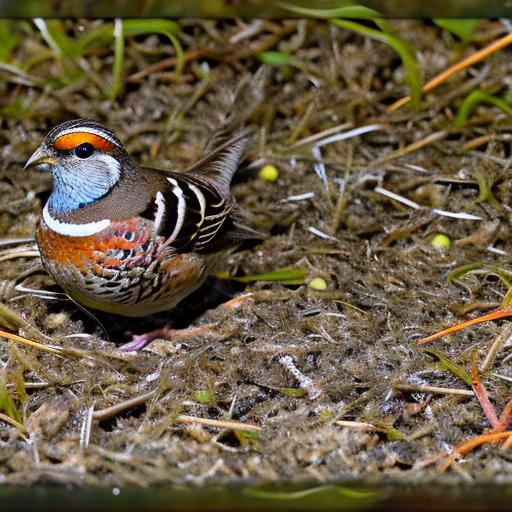Quail are small, ground-dwelling birds that are popular for their delicious eggs and meat. When it comes to housing quail, there are various options to consider, including small cages and big cages. The type of housing you choose for your quail will depend on several factors, including the number of quail you plan to keep, the space you have available, and your budget. In this article, we will explore the advantages and considerations of both small and big cages for quail housing, to help you make an informed decision for your quail farming venture.
Key Takeaways
- Small cages for quail offer space efficiency and ease of management
- Big cages for quail provide more space for natural behaviors and social interactions
- Considerations for small cage housing include ventilation, cleanliness, and space limitations
- Considerations for big cage housing include proper flooring, feeding and watering systems, and social dynamics
- Choosing the right cage for your quail depends on your space, management style, and the needs of your quail
Advantages of Small Cages for Quail
Small cages are a popular choice for housing quail, especially for small-scale quail farmers or hobbyists. One of the main advantages of small cages is that they take up less space, making them ideal for those with limited room for quail farming. Small cages are also easier to manage and clean, as they require less time and effort to maintain compared to larger cages. Additionally, small cages can be easily moved or rearranged, allowing for flexibility in the layout of your quail housing setup. This can be particularly useful for those who may need to reconfigure their quail housing based on seasonal changes or other factors. Overall, small cages offer a convenient and space-efficient option for housing quail, making them a popular choice for many quail farmers.
Another advantage of small cages for quail is that they can help to prevent overcrowding and aggression among the birds. When quail are kept in small groups in individual cages, they are less likely to fight or compete for resources, such as food and water. This can help to reduce stress and improve the overall welfare of the quail, leading to healthier and more productive birds. Additionally, small cages can make it easier to monitor the health and behavior of individual quail, allowing for early detection of any issues or illnesses. This level of individual care and attention can be beneficial for ensuring the well-being of your quail flock and maximizing their productivity.
Advantages of Big Cages for Quail
While small cages have their advantages, big cages also offer several benefits for housing quail. One of the main advantages of big cages is that they provide more space for the quail to move around and exercise. This can be particularly important for certain quail breeds or in situations where the birds are being raised for meat production, as it can help to prevent stress and encourage healthy growth and development. Additionally, big cages can allow for more natural behaviors, such as dust bathing and foraging, which can contribute to the overall well-being of the quail.
Another advantage of big cages for quail is that they can be more cost-effective in the long run. While big cages may require a larger initial investment compared to small cages, they can ultimately provide a more efficient use of space and resources. For example, big cages can accommodate a larger number of quail, allowing for higher production levels without the need for additional infrastructure. This can be particularly beneficial for commercial quail farmers looking to maximize their output while minimizing costs. Additionally, big cages can offer more flexibility in terms of design and layout, allowing for customization based on specific needs and preferences.
Considerations for Small Cage Housing
When considering small cage housing for your quail, there are several important factors to keep in mind. First and foremost, it’s crucial to ensure that each quail has enough space to move around comfortably and exhibit natural behaviors. Overcrowding in small cages can lead to stress, aggression, and reduced productivity among the quail. Additionally, ventilation is key in small cage housing to prevent the buildup of ammonia and other harmful gases. Proper ventilation can also help to regulate temperature and humidity levels within the cages, creating a more comfortable environment for the quail.
Another consideration for small cage housing is the design and materials of the cages themselves. It’s important to choose cages that are durable, easy to clean, and provide adequate protection from predators. Additionally, the layout of the cages should allow for easy access to food and water, as well as efficient waste management. Finally, it’s important to consider the placement of the cages within the overall farming setup, ensuring that they are situated in a location that is convenient for daily maintenance and monitoring.
Considerations for Big Cage Housing
When it comes to big cage housing for quail, there are several important considerations to take into account. One of the main considerations is ensuring that the cages provide enough space for the quail to move around freely and engage in natural behaviors. This may involve designing the cages with multiple levels or sections to maximize usable space and provide enrichment opportunities for the birds. Additionally, it’s important to consider the flooring of the cages, opting for materials that are comfortable for the quail to walk on and easy to clean.
Another consideration for big cage housing is the management of waste and litter within the cages. Proper waste management is crucial for maintaining a clean and healthy environment for the quail, as well as minimizing odors and potential health risks. This may involve implementing a system for regular cleaning and removal of waste, as well as providing suitable bedding materials to absorb moisture and control odors. Additionally, it’s important to consider the placement of feeders and waterers within the cages to ensure easy access for all the quail.
Choosing the Right Cage for Your Quail

In conclusion, both small and big cages offer unique advantages and considerations when it comes to housing quail. Small cages are convenient and space-efficient, making them a popular choice for many quail farmers, especially those with limited space or smaller flocks. On the other hand, big cages provide more space and flexibility, allowing for larger flocks and more natural behaviors among the quail. When choosing the right cage for your quail, it’s important to consider factors such as space availability, budget, flock size, and management preferences. By carefully weighing these considerations and understanding the specific needs of your quail flock, you can make an informed decision that will promote the health and productivity of your birds.
Additional Resources for Quail Housing
For those looking to learn more about quail housing and management, there are several resources available to provide guidance and support. Books such as “Raising Quail: A Beginner’s Guide” by Jason Perry and “The Quail Farmer’s Handbook” by Sarah Johnson offer valuable insights into all aspects of quail farming, including housing and husbandry practices. Additionally, online forums and communities such as BackYardChickens.com and QuailFarmersForum.com provide opportunities to connect with experienced quail farmers and seek advice on housing options and best practices. Finally, local agricultural extension offices and university cooperative extension programs may offer workshops or educational materials on quail farming and housing considerations specific to your region. By taking advantage of these resources, you can gain valuable knowledge and support to help you make informed decisions about housing your quail flock.
When it comes to keeping quail, the size of the cage can make a significant difference in their well-being. While some may argue that smaller cages are sufficient for quail, a recent article on PoultryWizard.com suggests that providing ample space for these birds is crucial for their health and happiness. The article, “Producers Pride Sentinel Chicken Coop,” emphasizes the importance of spacious living quarters for quail, allowing them to exhibit natural behaviors and reducing stress. It’s clear that the size of the cage plays a vital role in the overall welfare of quail.
FAQs
What are the advantages of keeping quail in small cages?
Small cages can be easier to manage and clean, and they can also help to prevent overcrowding and aggression among the quail. Additionally, small cages can be more space-efficient for those with limited space.
What are the advantages of keeping quail in big cages?
Big cages provide more space for the quail to move around and exhibit natural behaviors, such as dust bathing and foraging. They also allow for a larger number of quail to be kept together, which can be beneficial for breeding and social interaction.
What are the potential drawbacks of keeping quail in small cages?
Small cages can lead to stress and aggression among the quail, as well as potential health issues due to overcrowding. Additionally, small cages may not provide enough space for the quail to exhibit natural behaviors.
What are the potential drawbacks of keeping quail in big cages?
Big cages can be more challenging to clean and maintain, and they may require more space and resources. Additionally, if not properly managed, big cages can lead to social hierarchy issues and potential aggression among the quail.
What factors should be considered when deciding between small and big cages for quail?
Factors to consider include the number of quail being kept, available space, resources for cage maintenance, and the specific needs and behaviors of the quail species being kept. It’s important to prioritize the welfare and well-being of the quail when making this decision.
Meet Walter, the feathered-friend fanatic of Florida! Nestled in the sunshine state, Walter struts through life with his feathered companions, clucking his way to happiness. With a coop that’s fancier than a five-star hotel, he’s the Don Juan of the chicken world. When he’s not teaching his hens to do the cha-cha, you’ll find him in a heated debate with his prized rooster, Sir Clucks-a-Lot. Walter’s poultry passion is no yolk; he’s the sunny-side-up guy you never knew you needed in your flock of friends!







